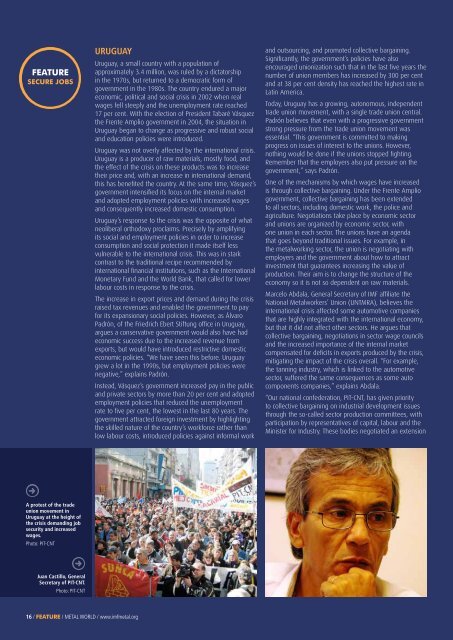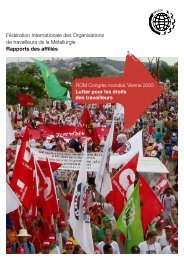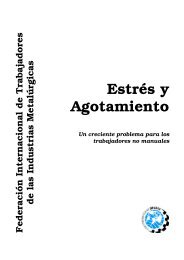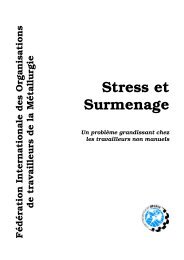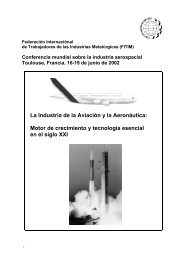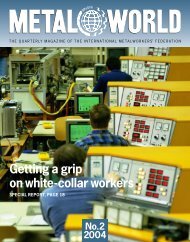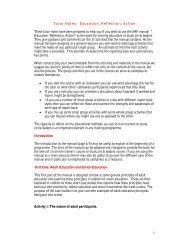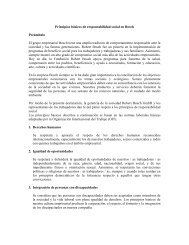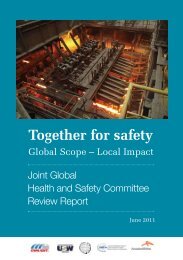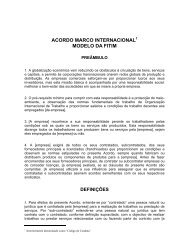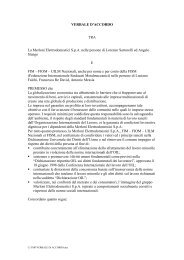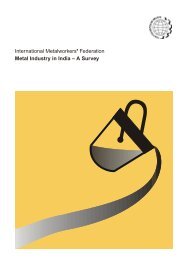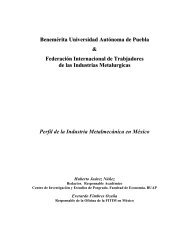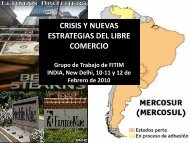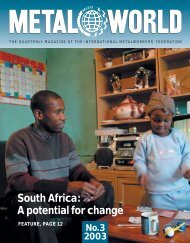Metal World 1 2011 - International Metalworkers' Federation
Metal World 1 2011 - International Metalworkers' Federation
Metal World 1 2011 - International Metalworkers' Federation
You also want an ePaper? Increase the reach of your titles
YUMPU automatically turns print PDFs into web optimized ePapers that Google loves.
FEATURE<br />
SECURE JOBS<br />
A protest of the trade<br />
union movement in<br />
uruguay at the height of<br />
the crisis demanding job<br />
security and increased<br />
wages.<br />
Photo: PIt-CNt<br />
Juan Castillo, General<br />
Secretary of PIT-CNT.<br />
Photo: PIt-CNt<br />
uRuGuAY<br />
16 / FeatUre / <strong>Metal</strong> <strong>World</strong> / www.imfmetal.org<br />
Uruguay, a small country with a population of<br />
approximately 3.4 million, was ruled by a dictatorship<br />
in the 1970s, but returned to a democratic form of<br />
government in the 1980s. The country endured a major<br />
economic, political and social crisis in 2002 when real<br />
wages fell steeply and the unemployment rate reached<br />
17 per cent. With the election of President Tabaré Vásquez<br />
the Frente Amplio government in 2004, the situation in<br />
Uruguay began to change as progressive and robust social<br />
and education policies were introduced.<br />
Uruguay was not overly affected by the international crisis.<br />
Uruguay is a producer of raw materials, mostly food, and<br />
the effect of the crisis on these products was to increase<br />
their price and, with an increase in international demand,<br />
this has benefited the country. At the same time, Vásquez’s<br />
government intensified its focus on the internal market<br />
and adopted employment policies with increased wages<br />
and consequently increased domestic consumption.<br />
Uruguay’s response to the crisis was the opposite of what<br />
neoliberal orthodoxy proclaims. Precisely by amplifying<br />
its social and employment policies in order to increase<br />
consumption and social protection it made itself less<br />
vulnerable to the international crisis. This was in stark<br />
contrast to the traditional recipe recommended by<br />
international financial institutions, such as the <strong>International</strong><br />
Monetary Fund and the <strong>World</strong> Bank, that called for lower<br />
labour costs in response to the crisis.<br />
The increase in export prices and demand during the crisis<br />
raised tax revenues and enabled the government to pay<br />
for its expansionary social policies. However, as Álvaro<br />
Padrón, of the Friedrich Ebert Stiftung office in Uruguay,<br />
argues a conservative government would also have had<br />
economic success due to the increased revenue from<br />
exports, but would have introduced restrictive domestic<br />
economic policies. “We have seen this before. Uruguay<br />
grew a lot in the 1990s, but employment policies were<br />
negative,” explains Padrón.<br />
Instead, Vásquez’s government increased pay in the public<br />
and private sectors by more than 20 per cent and adopted<br />
employment policies that reduced the unemployment<br />
rate to five per cent, the lowest in the last 80 years. The<br />
government attracted foreign investment by highlighting<br />
the skilled nature of the country’s workforce rather than<br />
low labour costs, introduced policies against informal work<br />
and outsourcing, and promoted collective bargaining.<br />
Significantly, the government’s policies have also<br />
encouraged unionization such that in the last five years the<br />
number of union members has increased by 300 per cent<br />
and at 38 per cent density has reached the highest rate in<br />
Latin America.<br />
Today, Uruguay has a growing, autonomous, independent<br />
trade union movement, with a single trade union central.<br />
Padrón believes that even with a progressive government<br />
strong pressure from the trade union movement was<br />
essential. “This government is committed to making<br />
progress on issues of interest to the unions. However,<br />
nothing would be done if the unions stopped fighting.<br />
Remember that the employers also put pressure on the<br />
government,” says Padrón.<br />
One of the mechanisms by which wages have increased<br />
is through collective bargaining. Under the Frente Amplio<br />
government, collective bargaining has been extended<br />
to all sectors, including domestic work, the police and<br />
agriculture. Negotiations take place by economic sector<br />
and unions are organized by economic sector, with<br />
one union in each sector. The unions have an agenda<br />
that goes beyond traditional issues. For example, in<br />
the metalworking sector, the union is negotiating with<br />
employers and the government about how to attract<br />
investment that guarantees increasing the value of<br />
production. Their aim is to change the structure of the<br />
economy so it is not so dependent on raw materials.<br />
Marcelo Abdala, General Secretary of IMF affiliate the<br />
National <strong>Metal</strong>workers’ Union (UNTMRA), believes the<br />
international crisis affected some automotive companies<br />
that are highly integrated with the international economy,<br />
but that it did not affect other sectors. He argues that<br />
collective bargaining, negotiations in sector wage councils<br />
and the increased importance of the internal market<br />
compensated for deficits in exports produced by the crisis,<br />
mitigating the impact of the crisis overall. “For example,<br />
the tanning industry, which is linked to the automotive<br />
sector, suffered the same consequences as some auto<br />
components companies,” explains Abdala.<br />
“Our national confederation, PIT-CNT, has given priority<br />
to collective bargaining on industrial development issues<br />
through the so-called sector production committees, with<br />
participation by representatives of capital, labour and the<br />
Minister for Industry. These bodies negotiated an extension


